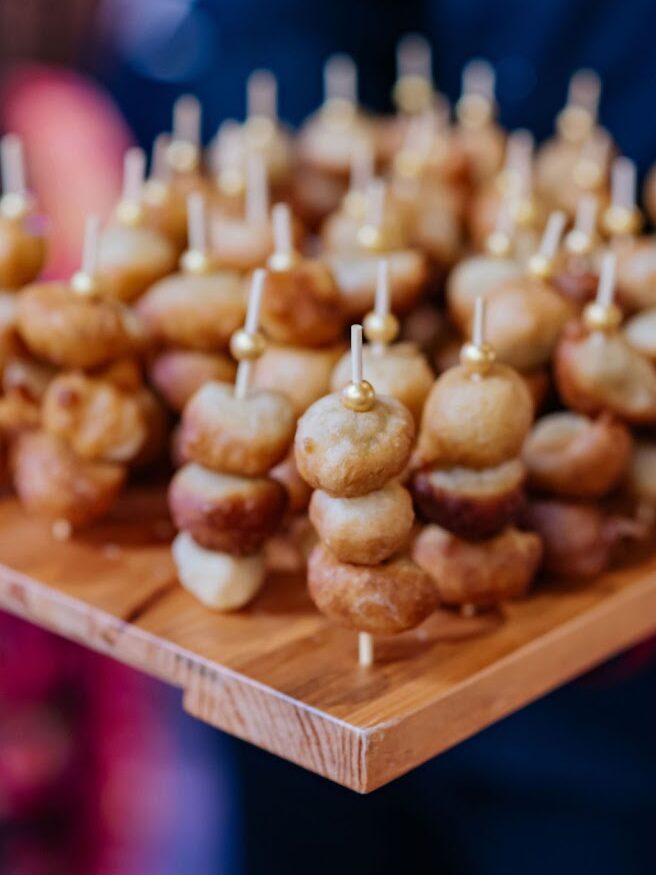
Food plays a significant role in Nigerian wedding celebrations, serving as a central element that brings together tradition, family values, and the joyous occasion itself. Whether you’re planning an intimate or large wedding, the feast accompanying the ceremony is a testament to Nigerian heritage and the importance of celebrating with loved ones.
In this blog post, we’ll explore the culinary wonders of Nigerian wedding food, delving into its historical roots, traditional staples, modern trends, and the nuances of planning the perfect wedding menu.
If you’re in the planning phase, this guide will help you navigate the diverse landscape of Nigerian wedding ceremony traditions and ensure your menu is a memorable highlight of your celebration.
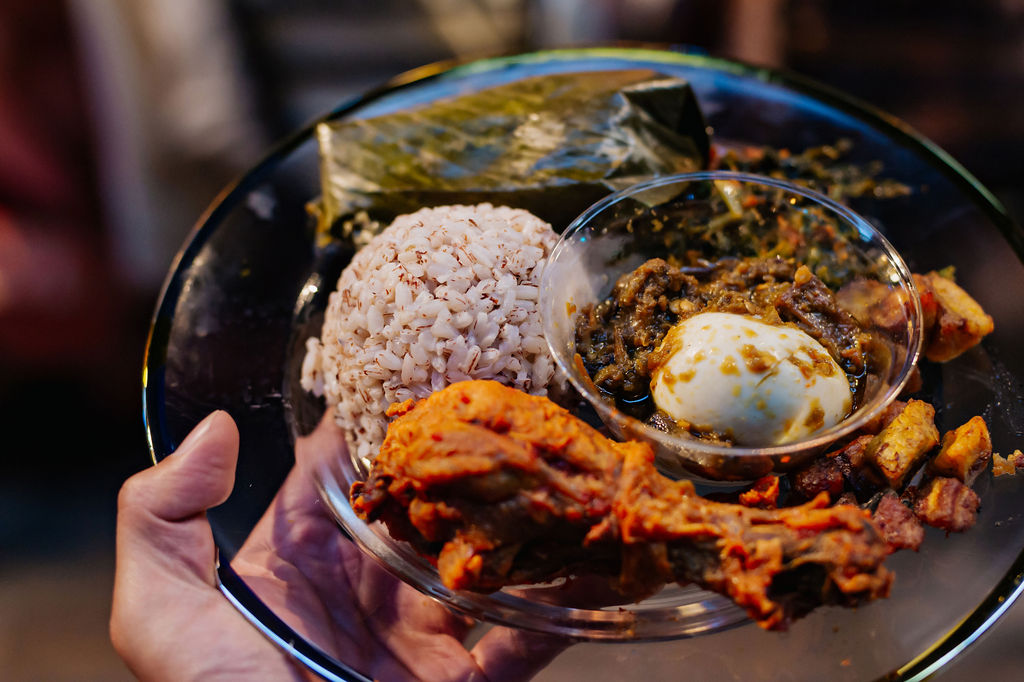
Historical and Cultural Background of Nigerian Wedding Food
The tradition of food at Nigerian weddings is steeped in history, influenced by the diverse ethnic groups and regions within Nigeria. Each ethnic group brings its signature dishes and food customs, often reflected in the wedding menu. Historically, food at weddings was more than just a meal; it was a reflection of the couple’s cultural background and a way to honor family traditions.
Various cultural influences, including the Yoruba, Igbo, Hausa, and other ethnic groups, have led to a rich tapestry of dishes celebrated at Nigerian weddings. These cultural practices have continued to shape Nigerian wedding menus, making them a significant aspect of Nigerian wedding ceremony traditions. Whether you’re opting for a traditional Nigerian feast or infusing modern elements, understanding the historical significance of Nigerian wedding food will give you a deeper appreciation of what it represents.
Key Traditional Nigerian Wedding Dishes
When planning a Nigerian wedding, the menu often centers around staple dishes beloved across the country. These dishes not only satisfy guests’ palates but also carry deep cultural significance.
Below is a sample of the most popular Nigerian dishes for weddings to serve as a starting point.
Stable Appetizers (“Small Chops”):
- Meat Pie: A savory pastry filled with spiced minced meat, potatoes, and vegetables, offering a comforting bite that’s always a hit at weddings.
- Puff Puff: These sweet, deep-fried dough balls are light and airy, providing a delightful treat that guests can’t resist.
- Spring Rolls: Crispy on the outside and filled with a mixture of seasoned vegetables and meat (or veggies only), spring rolls add a crunchy contrast to the small chops selection.
- Chin Chin: A crunchy, lightly sweetened snack made from fried dough, chin chin is perfect for munching and keeps guests satisfied while they wait for the main course.
- Suya (Beef or Chicken): Spicy, skewered meat that’s grilled to perfection, suya brings a burst of flavor and is often a crowd favorite.
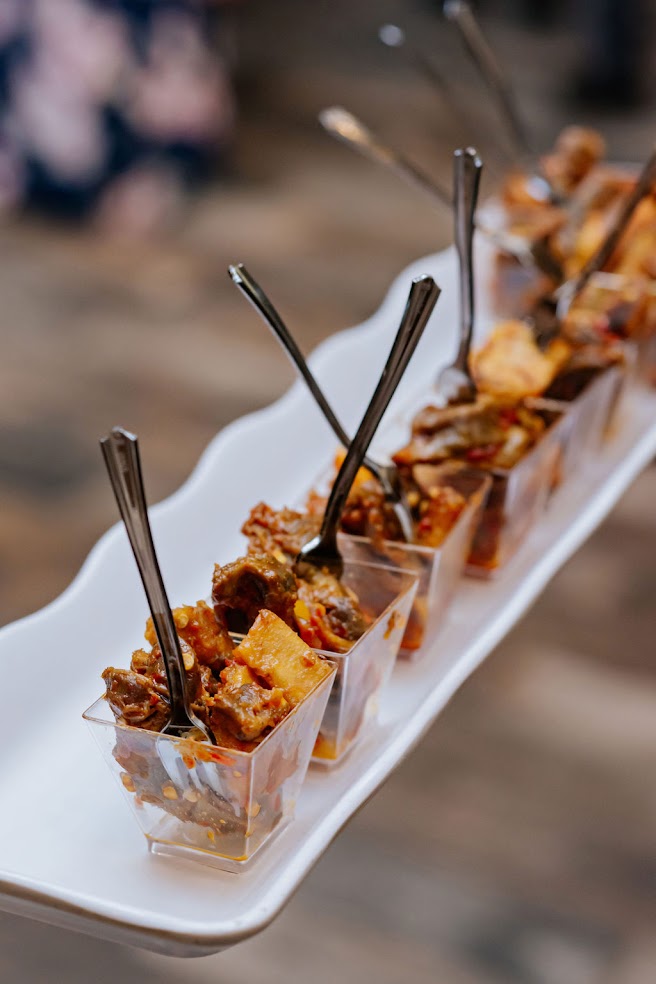
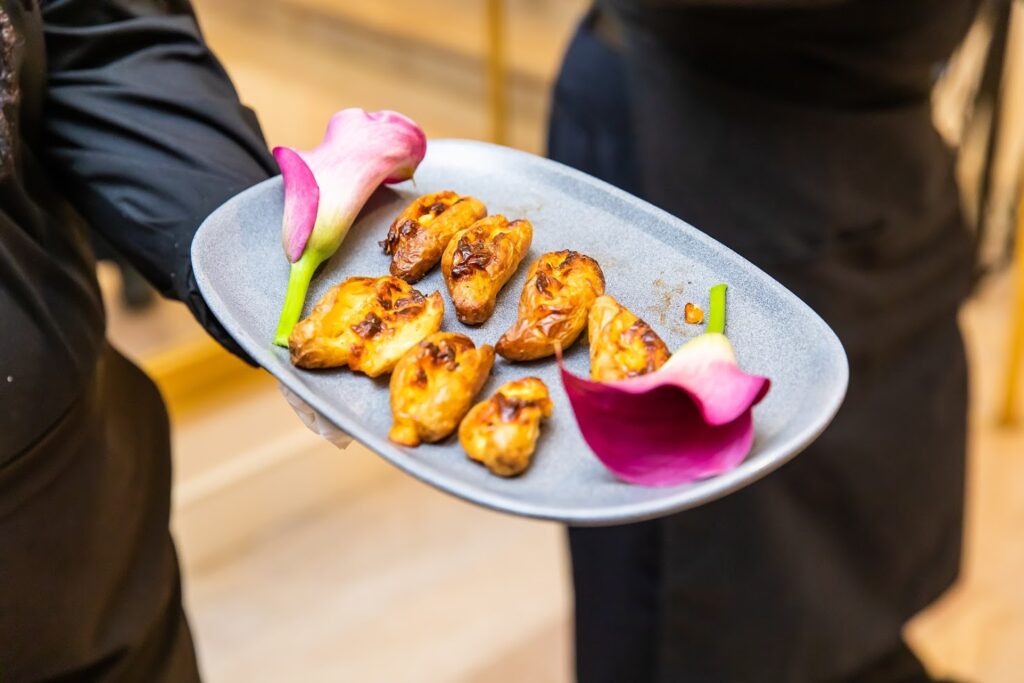
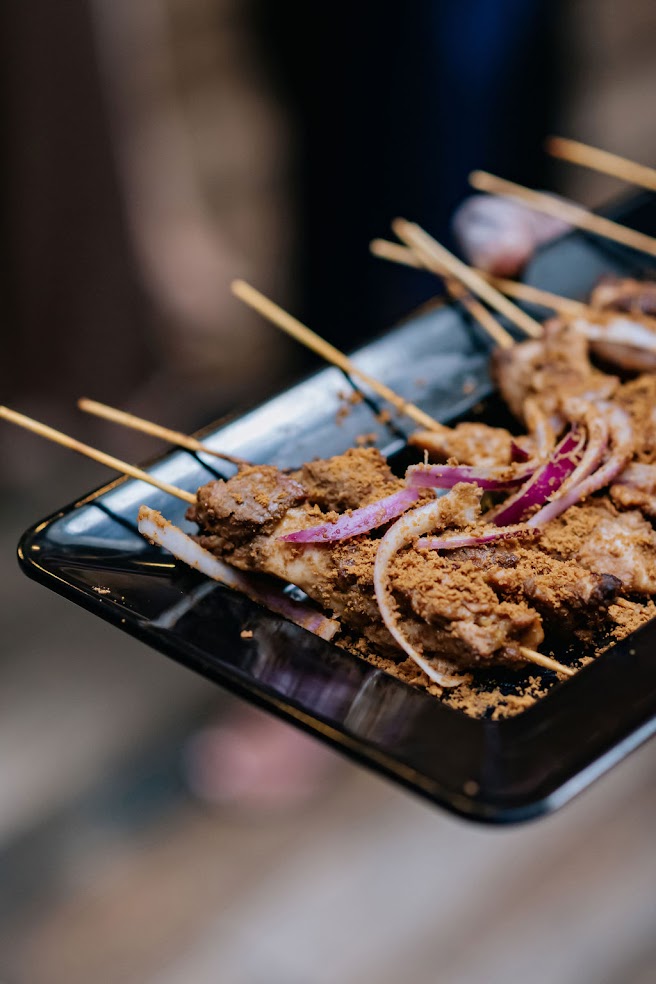
Staple Dinner Dishes:
- Jollof Rice: A must-have at any Nigerian wedding, Jollof rice is a flavorful one-pot dish loved by many. It’s often accompanied by fried rice, another wedding favorite.
- Fried Rice: A vibrant dish that combines rice with mixed vegetables, and a choice of proteins (typically shrimp or liver), creating a flavorful complement to the Jollof rice.
- Moi Moi: A steamed bean dish made from ground peeled beans, onions, and spices, often served as a side dish to enhance the variety of the meal.
- Plantain (Dodo): Slices of ripe plantains are fried to a golden brown, adding a sweet and soft side dish that complements many Nigerian meals.
- Pounded Yam: A smooth and stretchy dough-like staple made from boiled yams, pounded until it achieves a stretchy consistency, served alongside hearty soups.
- Popular Soups Served with Pounded Yam:
- Egusi Soup: Made from ground melon seeds, this rich and savory soup is often cooked with leafy vegetables, assorted meats, and fish.
- Efo Riro: A spinach-based stew simmered with meats, spices, and peppers, offering a spicy and aromatic accompaniment to pounded yam.
- Popular Soups Served with Pounded Yam:
- Ayamase: A spicy, green pepper stew often paired with rice, known for its bold flavors and rich, meaty texture.
- Yam Porridge: A comforting dish made from yams cooked in a flavorful tomato and pepper sauce, sometimes enriched with vegetables and meats.
- Stewed Chicken: Chicken cooked in a well-seasoned tomato, red bell pepper and onion based sauce, providing a hearty protein option that pairs well with rice and other staples.
- Stewed Beef: Tender beef slow-cooked in a spicy tomato, red bell pepper and onion based sauce, creating a rich and flavorful dish that’s a staple at many Nigerian weddings.
- Stewed Fish: Fresh fish simmered in a savory and spicy tomato, red bell pepper and onion based sauce, offering a lighter yet equally flavorful option for guests.
- Nigerian Salad: A vibrant, colorful salad that includes vegetables, eggs, baked beans, and often a mayonnaise dressing, adding a refreshing element to the meal.
Nice to Have Items:
- Amala on the Spot (Amala, Gbegiri & Ewedu) with Assorted Meat Stew: A traditional Yoruba delicacy where Amala (made from yam or cassava flour) is served with a duo of soups (Gbegiri, a bean soup, and Ewedu, a jute leaf soup) and assorted meat stew. This station is a hit for guests who appreciate authentic Nigerian flavors.
- Zobo: A refreshing drink made from hibiscus leaves, Zobo is a tart and slightly sweet beverage often served chilled, providing a cooling contrast to the spicy foods.
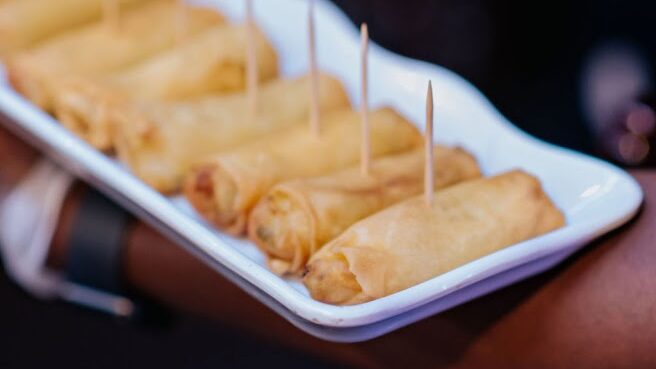
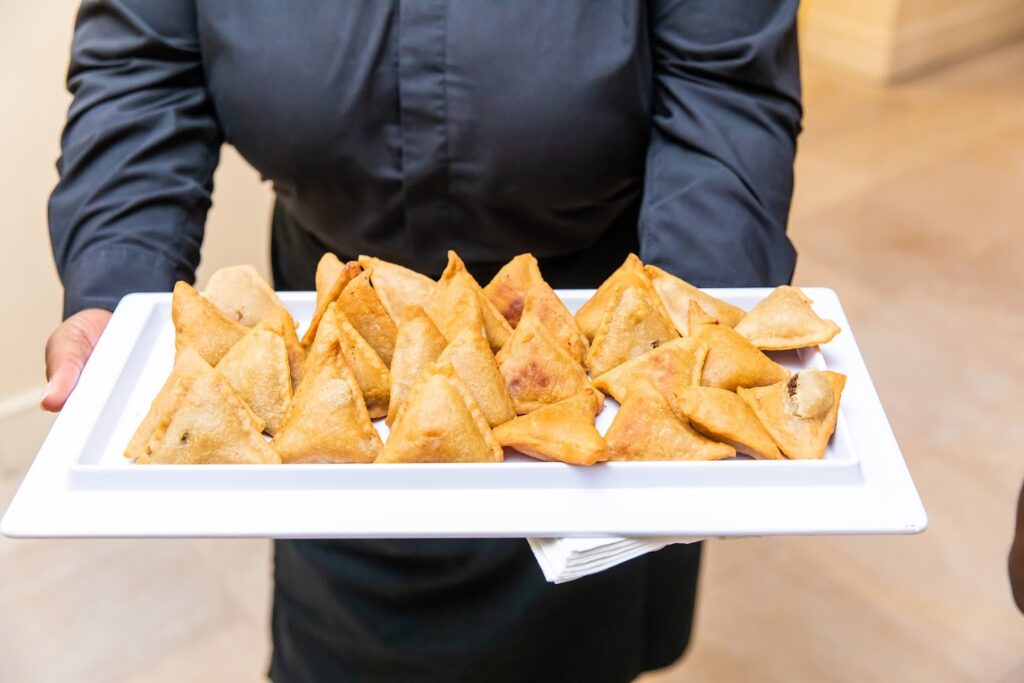
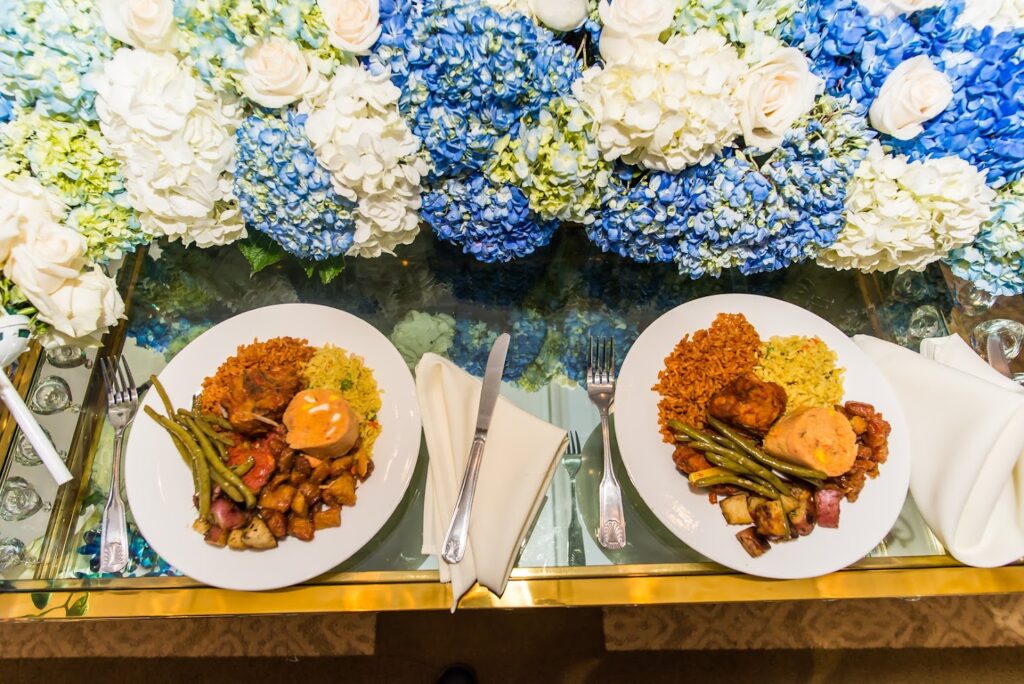
Modern Trends in Nigerian Wedding Food
While traditional dishes remain at the heart of Nigerian wedding menus, contemporary trends are making their way into wedding celebrations. Today’s couples are increasingly blending traditional and modern flavors, creating a unique culinary experience for their guests.
Fusion Cuisine: Modern Nigerian weddings often feature fusion dishes that combine traditional ingredients with global culinary techniques. This blend of flavors caters to diverse guest palates while honoring Nigerian heritage.
Dietary Considerations: As weddings become more inclusive, dietary preferences and restrictions are also being considered. Many couples are now offering vegetarian, vegan, and gluten-free options, ensuring that all guests can enjoy the feast.
Budget Considerations: Typically, a full service caterer that provides all rentals needed as well as the serving staff is about $60 per guest for a buffet. Plated and family style meals vary as there is a considerable increase in staff needed (and labor rates are different throughout the U.S.).
Serving and Presentation Tips
Presentation plays a significant role in how wedding food is perceived and enjoyed. Nigerian wedding food can be presented in various styles, each offering a unique experience.
Buffet Style: A popular choice for large weddings, allowing guests to choose from a wide variety of dishes. It’s cost-effective and provides a relaxed dining atmosphere.
Plated Service: Offers a more formal dining experience, with each guest served individually. Guests can still pick from 2 to 3 plated options when they RSVP but this serving style offers the least variety for guests. Plated service also only works if you have a process to ensure all guests RSVP and provide their desired plated option.
Family Style: Encourages a communal dining experience, with guests sharing large platters of food at each table, reflecting the communal aspect of Nigerian culture. This serving option offers similar variety as a buffet but also requires a lot of rentals and staff to make it work flawlessly.
Cultural Elements: Incorporating cultural symbols and decorations into the presentation of the food adds a personal touch. For example, traditional cloth or beaded table settings can be used to enhance the display.
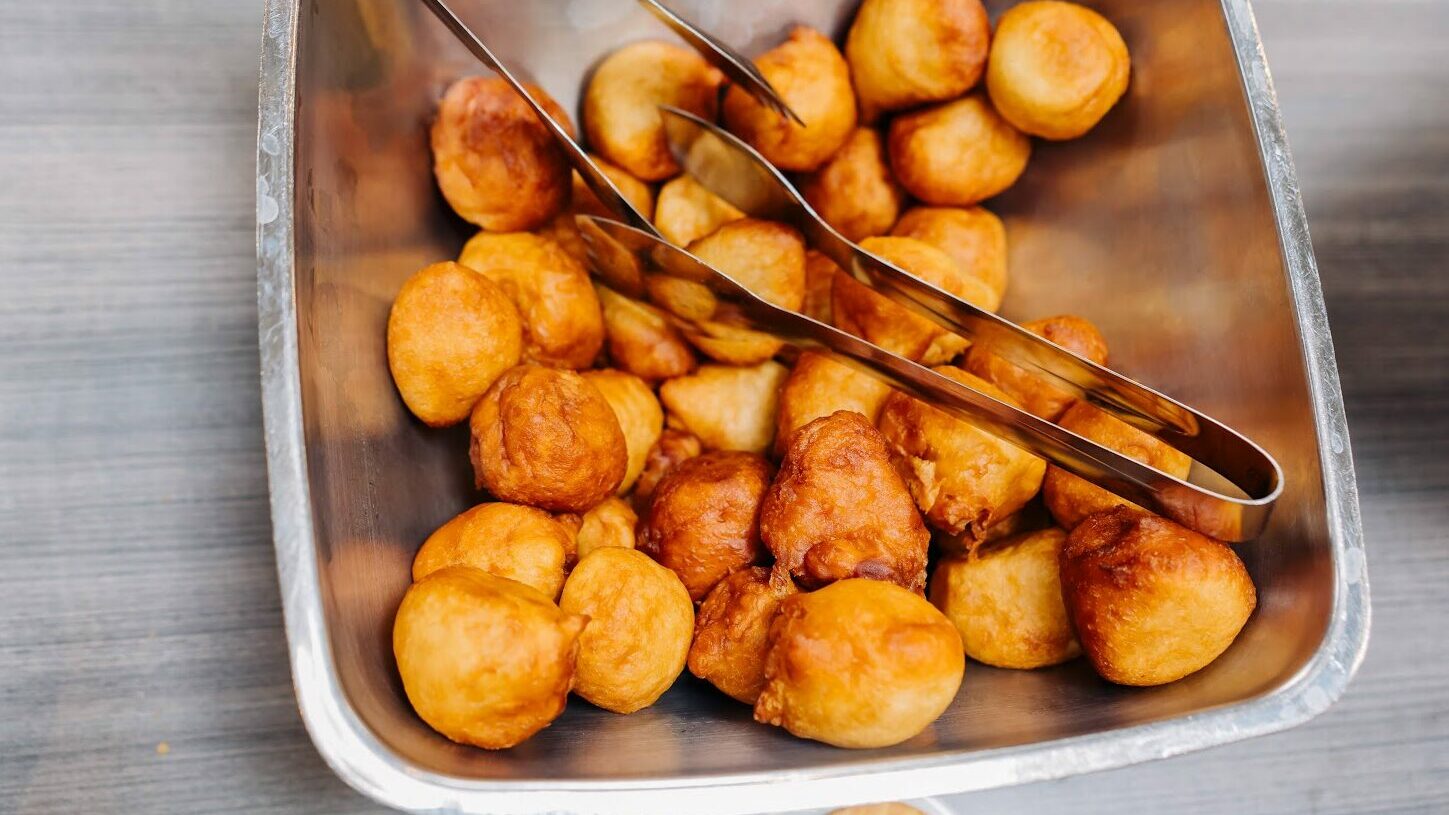
Common Challenges and Solutions in Nigerian Wedding Food Planning
Planning a wedding menu comes with its challenges, especially when it involves traditional Nigerian dishes.
Finding the Right Caterer: Not all caterers are equipped to handle the complexities of Nigerian wedding food, including the cultural significance of each dish. It’s also important to find a caterer who is not only skilled but is professional, has a contract, all rentals needed and a professional staff.
Managing Last-Minute Changes: Weddings are dynamic events, and sometimes guest lists can change unexpectedly. Having a flexible caterer who can accommodate last-minute additions or adjustments is essential.
Ensuring Enough Food: Over-preparing is often better than under-preparing, especially at Nigerian weddings where food is a central part of the celebration and some guests just show up without RSVP’ing or bring additional guests. Work with your caterer to ensure there’s enough food for all guests, including potential unexpected ones.
Nigerian wedding food is more than just a meal; it’s a celebration of culture, tradition, and family. Thoughtful planning and a deep understanding of the cultural significance of each dish can elevate your wedding menu, creating lasting memories for you and your guests.
As you plan your wedding, embrace the opportunity to showcase your heritage through the food you serve. By blending tradition with modern trends, you can create a menu that honors the past while celebrating the present.
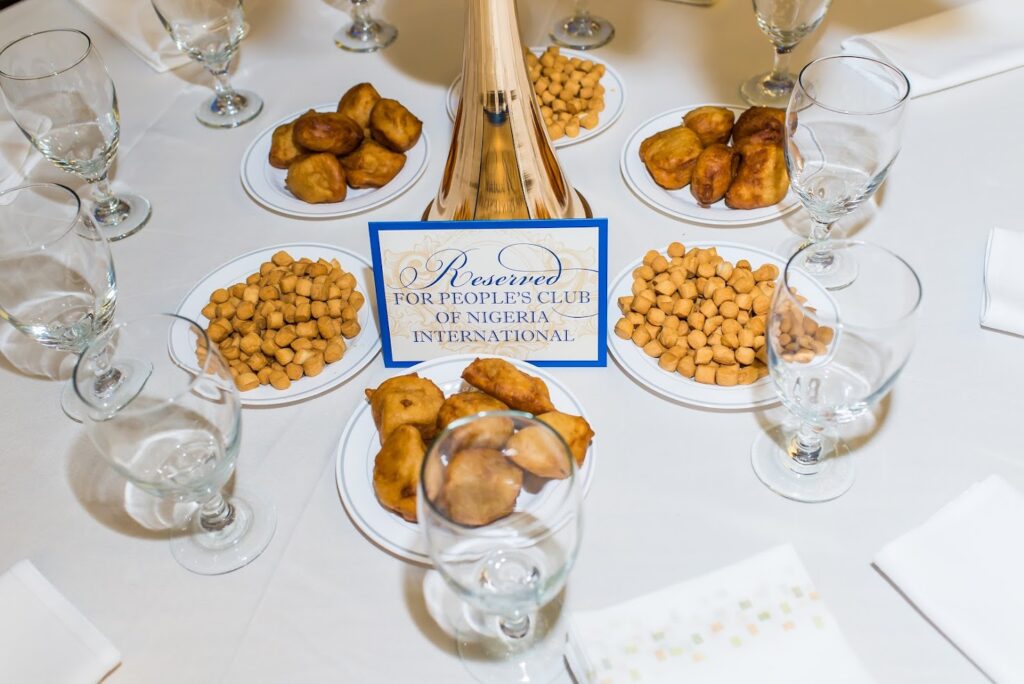
Explore more about Nigerian wedding traditions by checking out our related blog posts. Learn more about topics such as the significance of Aso-ebi, the art of money spraying, and tips for planning a culturally rich wedding celebration.
Feel free to share your favorite Nigerian wedding dishes and menu ideas in the comments below!







